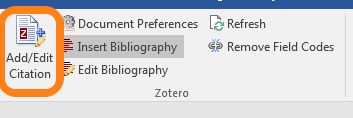

- #ZOTERO IN WORD NOT IN ORDER PDF#
- #ZOTERO IN WORD NOT IN ORDER PORTABLE#
- #ZOTERO IN WORD NOT IN ORDER SOFTWARE#
- #ZOTERO IN WORD NOT IN ORDER FREE#
Features such as formatted citation export make it very simple for users to create a list of references in the perfect format desired for a manuscript or other use. Also, Zotero is integrated with Microsoft Word and other word processors and works in all computer formats (PC, Mac, and Linux). These notes are saved automatically and organized in conjunction with the citation information. Users can enter small notes on a particular reference by simply typing in an input field. Zotero's note-taking feature is very practical. Other major differences include enhanced searching and remote library access.
#ZOTERO IN WORD NOT IN ORDER SOFTWARE#
Other programs operate as stand-alone software in that they require constant switching between the Internet browser and the program interface. One major difference is that Zotero is woven into the Internet browser itself and is used while perusing resources on the Internet. However, as described below, Zotero is not about downloading and/or distributing resources in a circumferential way, but bringing order to the resources users frequently use.Īt first glance, Zotero appears similar to older citation management software such as EndNote or ProCite however, there are many differences. Caution is urged when using Zotero, especially in regard to collecting, storing, and distributing copyrighted materials.

Users will find that traditional access rules still apply (e.g., subscription to a journal) when accessing a resource or using the bookmark feature to return to that resource. Zotero is compatible with PubMed, HighWire Press, Google Scholar, and dozens of other databases and library resources accessible by Internet browser.
#ZOTERO IN WORD NOT IN ORDER PDF#
For example, if you were using Zotero and viewing this article as a PDF file on the Internet and wanted to save it for future use, a simple click of an icon would store the reference and the PDF and automatically name the PDF (e.g., author-date-truncated title). Depending on the type of resource, this may include, but is not limited to, the title, authors, journal name, year published, volume, and page, as well as a hyperlink to the source. Zotero is a reference citation management tool that can sense when users are viewing a book, article, or other object on the web automatically capture citation information record it in the correct fields and keep a bookmark of the hypertext markup language (HTML) source. Zotero was developed and is maintained by the Center for History and New Media at George Mason University and is funded in part by the US Institute of Museum and Library Services.
#ZOTERO IN WORD NOT IN ORDER FREE#
Zotero is available at no cost as an extension of the open-source Firefox, a free Internet browser that allows customization with extensions-tools that modify the browser to suit the needs of the user. Zotero has been designed specifically with researchers in mind to assist in writing papers, managing references, and organizing research materials and is compatible with most medical literature databases such as MEDLINE, PubMed, and HighWire Press. However, I recently discovered a freely available computer software called Zotero that has made my life easier and my so-called “sophisticated” system obsolete.įirst released in 2006, Zotero bills itself as “the next generation research tool” that streamlines the research process.

#ZOTERO IN WORD NOT IN ORDER PORTABLE#
In my system, I would manually save portable document format (PDF) files by manually typing in the title of the article, the journal it was published in, and the year of publication. Until recently, I believed that I had developed a sophisticated system of bookmarks, email messages to myself, word documents, and the like to save useful references, citations, and other resources that I felt were essential to my clinical and academic productivity. As an academic writer, I always prided myself on my technical savvy.


 0 kommentar(er)
0 kommentar(er)
